Chicago Express
Author: Harry Wu
Publisher: Queen Games
Year: 2008
review by

| x |
|
|
|
|
|
|
|
|
|
|
|
|
|
|
|
|
|
|
|
|
|
|
|
|
|
|
|
|
|
|
|
|
|
|
|
|
|
|
|
|
|
|
|
|
|
|
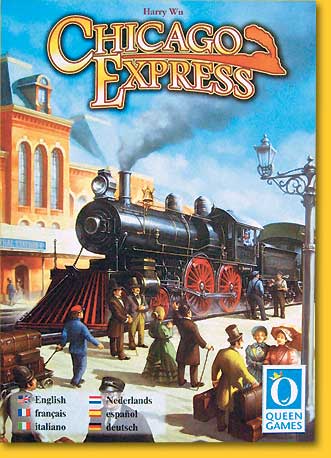 |
Playing with trains; it mainly is a boys hobby, or actually it are the fathers who pass on their passion, generation by generation. In most houses one can find a train set in the attic or the garage, waiting for a new generation to build their own configuration to play with. In board game land we find endless variations on this theme - we lost count on how many times we have played with trains on a map of the United States. Titles such as ‘1830’, ‘Age of Steam’ or ‘Santa Fé Rails’ all go back to the same theme: the opening up of the West by railroads. Does the umpteenth game on this subject deliver enough excitement and game pleasure? Do we want to play it again? And again? And will the ladies join us? |
|
| x |
|
|
|
|
|
|
|
|
|
|
|
|
|
|
|
|
|
|
|
|
|
|
|
|
|
|
|
|
|
|
|
|
|
|
|
|
|
|
|
|
|
|
|
|
|
|
| In order to not violate history too much, a number of known names of railroad companies show up at the start: the East coast of the United States. From here the task of opening up the West lies ahead, but in these type of games, the West usually ends in Chicago. Contrary to more recent real life departure bonuses, an arrival bonus is given for each company that has laid track to Chicago, and this bonus is sufficient incitement to direct each company’s track towards this city. |
|
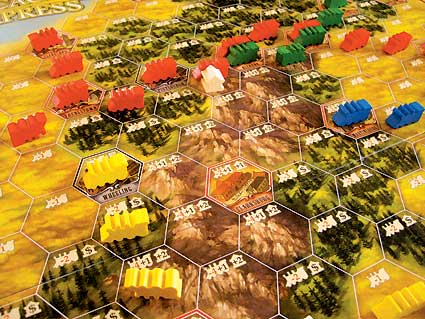 |
|
| x |
|
|
|
|
|
|
|
|
|
|
|
|
|
|
|
|
|
|
|
|
|
|
|
|
|
|
|
|
|
|
|
|
|
|
|
|
|
|
|
|
|
|
|
|
|
|
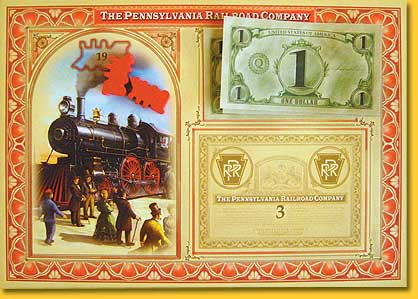 |
The companies need money to build their track, and this money is generated by shares. At the start of the game from each of the four Eastern companies one share is auctioned; the share goes to the highest bidding player and the offered money goes to the company’s cash. In the course of the game a player could choose to lay a maximum of three track for a company of which he has at least one share in his possession; the building costs are paid from the company’s cash. What the building costs are is stated in each hexagon of the playing board; subsequently the player places a train in the company’s colour in the hex. |
|
| x |
|
|
|
|
|
|
|
|
|
|
|
|
|
|
|
|
|
|
|
|
|
|
|
|
|
|
|
|
|
|
|
|
|
|
|
|
|
|
|
|
|
|
|
|
|
|
It could be that a player is the only one having one or more shares of a company, but more often the company has two or more shareholders; both having its advantages.
After a complete round, players are paid dividend to the value of their shares, and they can use this money to invest in additional shares for one or the other company. Which company is attractive for buying shares depends on the company results, but since the game only has the basic principles of a free economy incorporated, it merely comes down to which company is ahead on the income track, and has the best prospects. |
|
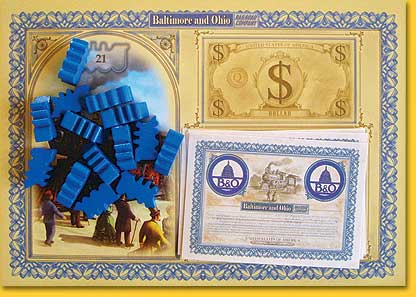 |
|
| x |
|
|
|
|
|
|
|
|
|
|
|
|
|
|
|
|
|
|
|
|
|
|
|
|
|
|
|
|
|
|
|
|
|
|
|
|
|
|
|
|
|
|
|
|
|
|
 |
|
| x |
|
|
|
|
|
|
|
|
|
|
|
|
|
|
|
|
|
|
|
|
|
|
|
|
|
|
|
|
|
|
|
|
|
|
|
|
|
|
|
|
|
|
|
|
|
|
| One such prospect could be that the company already has two or more shareholders; all these share a common interest, or don’t they? The other shares in a player’s portfolio are also important to consider: why would a player invest in a company that is profitable for all other shareholders, as he does not have to share the profits for a company he is the sole shareholder of? |
|
| x |
|
|
|
|
|
|
|
|
|
|
|
|
|
|
|
|
|
|
|
|
|
|
|
|
|
|
|
|
|
|
|
|
|
|
|
|
|
|
|
|
|
|
|
|
|
|
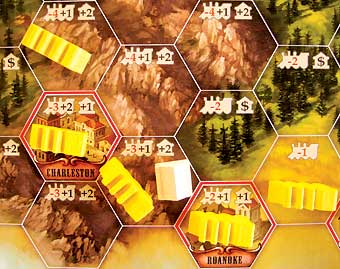 |
|
And how can a company’s result be influenced anyway? Well, the track of a company goes over various terrain that increases its value, such as track that leads to cities or through mountains.
Further, the value of a company can be increased by developing certain hexes and placing a house on it; the value is increased by the number that is stated in such development hexes. |
|
| x |
|
|
|
|
|
|
|
|
|
|
|
|
|
|
|
|
|
|
|
|
|
|
|
|
|
|
|
|
|
|
|
|
|
|
|
|
|
|
|
|
|
|
|
|
|
|
| Also there are three industry cities that, once connected to a company’s track, increase the value of that company each time a player has chosen for a development of that city; the status of those cities is kept on a separate track. |
|
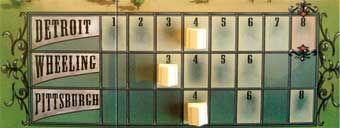 |
|
| x |
|
|
|
|
|
|
|
|
|
|
|
|
|
|
|
|
|
|
|
|
|
|
|
|
|
|
|
|
|
|
|
|
|
|
|
|
|
|
|
|
|
|
|
|
|
|
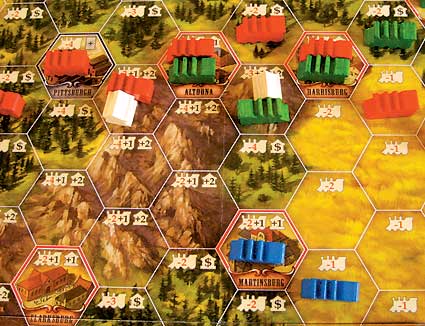 |
|
With only 120 dollar divided by the number of participating players in cash, players have not much to spend; they have to be careful not to bid too high in a bidding to be still in the race when an other share gets auctioned. With the invested money a player can build on ‘his’ company track, but things go faster when there is a second shareholder who also can choose to build in his turn, thereby not only increasing the value of the company faster, but also decreasing the distance to Chicago twice as fast. |
|
| x |
|
|
|
|
|
|
|
|
|
|
|
|
|
|
|
|
|
|
|
|
|
|
|
|
|
|
|
|
|
|
|
|
|
|
|
|
|
|
|
|
|
|
|
|
|
|
| The value of each company reaching Chicago is increased by 7, but more important is the fact that there is an instant and inbetween payment of dividend to all shareholders of such a company. |
|
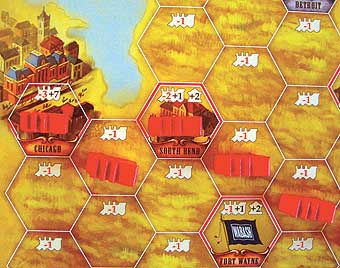 |
|
| x |
|
|
|
|
|
|
|
|
|
|
|
|
|
|
|
|
|
|
|
|
|
|
|
|
|
|
|
|
|
|
|
|
|
|
|
|
|
|
|
|
|
|
|
|
|
|
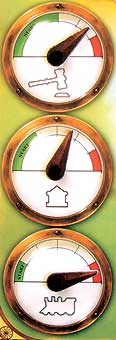 |
|
With this all player actions have been described: laying track, auction a share, or develop a hex. Each time when a player has chosen one of these actions, he increases the arrow of the corresponding pressure gauge one level; when the arrow has reached the red section the action is not available, and when two pressure gauges have their arrows in red, a round ends. Dividend is paid to all shareholders, the pressure gauges are reset, the marker for Detroit is increased by one, and a new round begins.
The game ends at the end of the round in which one of the following conditions heve been met: three or more companies have run out of trains, three or more companies have issued all their shares, there are only three or less development houses in stock, or the marker for Detroit has reached ‘8’. There is a final payment of dividend, after which the player with the most money has won. |
|
|
|
|
|
|
| x |
|
|
|
|
|
|
|
|
|
|
|
|
|
|
|
|
|
|
|
|
|
|
|
|
|
|
|
|
|
|
|
|
|
|
|
|
|
|
|
|
|
|
|
|
|
|
| x |
|
|
|
|
|
|
|
|
|
|
|
|
|
|
|
|
|
|
|
|
|
|
|
|
|
|
|
|
|
|
|
|
|
|
|
|
|
|
|
|
|
|
|
|
|
|
| x |
|
|
|
|
|
|
|
|
|
|
|
|
|
|
|
|
|
|
|
|
|
|
|
|
|
|
|
|
|
|
|
|
|
|
|
|
|
|
|
|
|
|
|
|
|
|
 |
|
|
|
|
|
|
|
|
|
|
|
|
|
|
|
|
|
|
|
|
|
|
|
|
|
|
|
|
|
|
|
|
|
|
|
|
|
|
|
|
|
|
| New players of the genre will have to get accustomed to the fact that there is no player colour, but instead an action is chosen for a company, and then only one of which a player has at least one share of. The possibilities each time must be chosen carefully: trying to participate in a company all other players already have a share of, or first build some other track and try to acquire a share later in another possible lucrative company? A bit of this and a bit of that, nope, this does not help to make up a player’s mind, and that is because the game has an enjoyable mix of applying gut feeling and using a healthy speculative mind. |
|
| x |
|
|
|
|
|
|
|
|
|
|
|
|
|
|
|
|
|
|
|
|
|
|
|
|
|
|
|
|
|
|
|
|
|
|
|
|
|
|
|
|
|
|
|
|
|
|
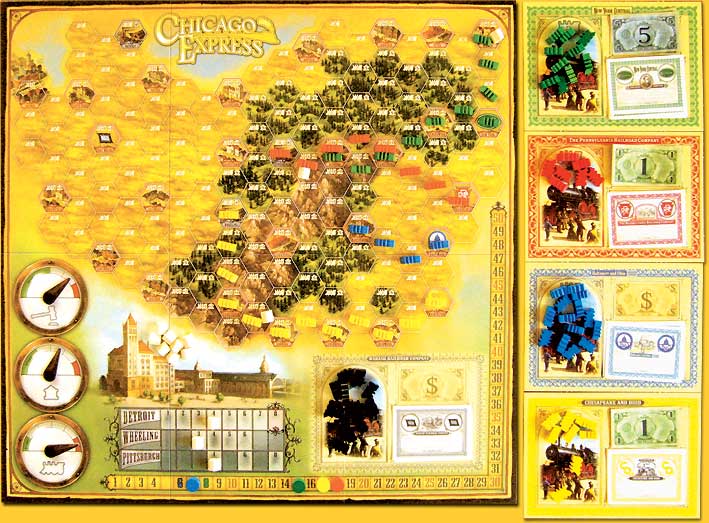 |
| x |
|
|
|
|
|
|
|
|
|
|
|
|
|
|
|
|
|
|
|
|
|
|
|
|
|
|
|
|
|
|
|
|
|
|
|
|
|
|
|
|
|
|
|
|
|
|
| Each company has a different amount of shares and trains, and whether Chicago or an industry city can be reached by a certain route with the company’s money, can be calculated. And to a certain degree can be calculated, what the return of investment will be, and thus how much money can be offered in a bidding. But emotion also plays an important part: I want this share too, or: I just don’t want the other player to have it! |
|
| x |
|
|
|
|
|
|
|
|
|
|
|
|
|
|
|
|
|
|
|
|
|
|
|
|
|
|
|
|
|
|
|
|
|
|
|
|
|
|
|
|
|
|
|
|
|
|
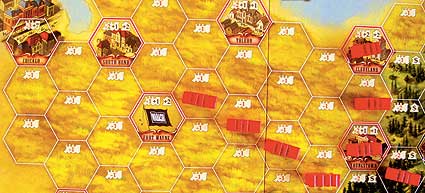 |
|
Major shareholders additionally must be on the lookout for the small speculator who wants to play him a nasty trick: let’s say a company only needs three track to reach Chicago, but this could be of less interest to the small speculator who obstinately chooses to build the last track in a totally different direction! |
|
| x |
|
|
|
|
|
|
|
|
|
|
|
|
|
|
|
|
|
|
|
|
|
|
|
|
|
|
|
|
|
|
|
|
|
|
|
|
|
|
|
|
|
|
|
|
|
|
| Players must realise that they are completely responsible for the volume of a company’s cash, as all the bidden money for a share goes there. This means that a company will dispose over quite a sum of money when an auction has been fierce. A thoughtless bid of ‘1’ could confront a player with the rest of the players all passing. This makes him the new and proud owner of a cheap share, but it does not get him anything as the cash of the company only increases with 1 dollar for which in fact no real increase of value by laying track can be bought! |
|
| x |
|
|
|
|
|
|
|
|
|
|
|
|
|
|
|
|
|
|
|
|
|
|
|
|
|
|
|
|
|
|
|
|
|
|
|
|
|
|
|
|
|
|
|
|
|
|
| The moment Chicago is connected by rail, one last company with only two shares comes into play, and, given the distance from the East coast to Chicago, this usually is towards the end of the game. This company feels as a needless appendix but can be explained as the game was first released by a smaller publisher under the name of this company: ‘Wabash Cannonball’. As the emphasis actually is Chicago, this also contributed to the name change to ‘Chicago Express’; ‘Wabash’ however remained in the game as a company. |
|
 |
|
| x |
|
|
|
|
|
|
|
|
|
|
|
|
|
|
|
|
|
|
|
|
|
|
|
|
|
|
|
|
|
|
|
|
|
|
|
|
|
|
|
|
|
|
|
|
|
|
‘Chicago Express’ has a lot that its former mentioned taller brothers have too, but it plays in considerably less time. Stripped of all decoration this is a very playable and fast game that has enough depth to captivate for the full hour it lasts - and for one more time, and one more! And the ladies will gladly join too!
© 2009 Richard van Vugt
Chicago Express, Harry Wu, Queen Games, 2008 - 2 to 6 players, 12 years and up 60 minutes
|
|
  |
|
|
|
|
|
|
|
|
|
|
|
|
|
|
|
|
|
|
|
|
|
|
|
|
|
|
|
|
|
|
|
|
|
|
|
|
|
|
|
|
|
|
  |
|
|
|
|
|
|
|
|
|
|
|
|
|
|
|
|
|
|
|
|
|
|
|
|
|
|
|
|
|
|
|
|
|
|
|
|
|
|
|
|
|
|
  |
|
|
|
|
|
|
|
|
|
|
|
|
|
|
|
|
|
|
|
|
|
|
|
|
|
|
|
|
|
|
|
|
|
|
|
|
|
|
|
|
|
|
  |
|
|
|
|
|
|
|
|
|
|
|
|
|
|
|
|
|
|
|
|
|
|
|
|
|
|
|
|
|
|
|
|
|
|
|
|
|
|
|
|
|
|
  |
|
|
|
|
|
|
|
|
|
|
|
|
|
|
|
|
|
|
|
|
|
|
|
|
|
|
|
|
|
|
|
|
|
|
|
|
|
|
|
|
|
|
| x |
|
|
|
|
|
|
|
|
|
|
|
|
|
|
|
|
|
|
|
|
|
|
|
|
|
|
|
|
|
|
|
|
|
|
|
|
|
|
|
|
|
|
|
|
|
|
| x |
|
|
|
|
|
|
|
|
|
|
|
|
|
|
|
|
|
|
|
|
|
|
|
|
|
|
|
|
|
|
|
|
|
|
|
|
|
|
|
|
|
|
|
|
|
|
 |
|
|
|
|
|
|
|
|
|
|
|
|
|
|
|
|
|
|
|
|
|
|
|
|
|
|
|
|
|
|
|
|
|
|
|
|
|
|
|
|
|
|
 |
|
|
|
|
|
|
|
|
|
|
|
|
|
|
|
|
|
|
|
|
|
|
|
|
|
|
|
|
|
|
|
|
|
|
|
|
|
|
|
|
|
|
| x |
|
|
|
|
|
|
|
|
|
|
|
|
|
|
|
|
|
|
|
|
|
|
|
|
|
|
|
|
|
|
|
|
|
|
|
|
|
|
|
|
|
|
|
|
|
|
 |
|
|
|
|
|
|
|
|
|
|
|
|
|
|
|
|
|
|
|
|
|
|
|
|
|
|
|
|
|
|
|
|
|
|
 |
|
|
|
|
|
|
|
|
|
|
|
|
|
|
|
|
|
|
|
|
|
|
|
|
|
|
|
|
|
|
|
|
|
|